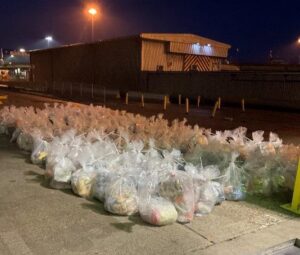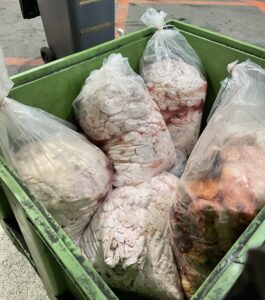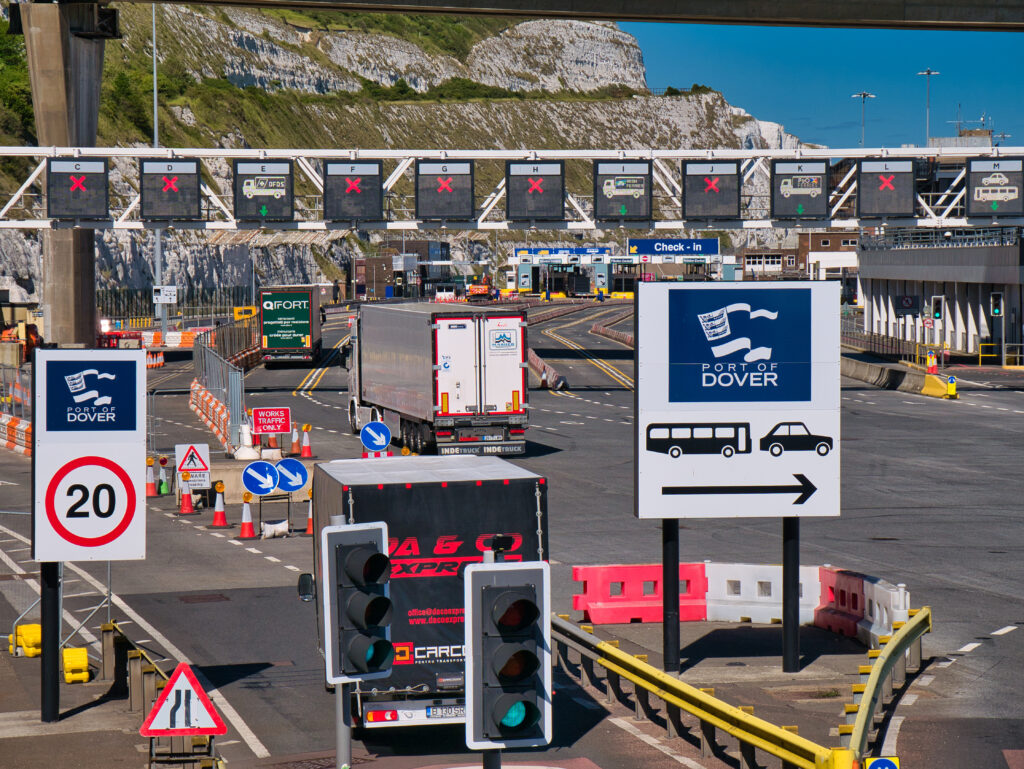Dover District Council has called on Defra to scrap its plans to cut funding, worth £3 million, for essential checks for illegal imports at the Port of Dover.
In a DDC report, published ahead of a cabinet meeting today, it has emerged that Defra has tried to justify the cuts by arguing that the council could, instead, recover the costs of the work by charging illegal meat importers. But DDC says Defra has been unable to demonstrate how the service could be self-funding.
Since new rules banning the import of pork products weighing over 2kg not produced to EU commercial standards were introduced in September 2022, DPHA and Border Force UK have seized more than 64 tonnes of illegally imported meat.
Lucy Manzano, head of port health & public protection at Dover District Council, (DDC) told Pig World in January that Defra had informed that council just before Christmas that the budget for this work, introduced to reduce the risk of the African swine fever (ASF) virus entering the UK, was to be cut by up to 70%.
She described the proposed cuts at Dover as potentially ‘disastrous’ for the pig sector, stressing that the councils resources would be severely stretched as the Port Health Authority was also being asked to extend the work to Coquelles, where the Channel Tunnel starts in France.
Catastrophic budget cuts

The DDC report confirms that Defra is withdrawing 66%, £2m out of £3.2m, of Port Health Authority (PHA) funding from Dover in 2024/25 and the remaining 33% (£1.2m) in 2025/26.
“Despite vague Defra assurances, the failure to properly resource the port health function poses a critical and irresponsible bio-security threat to the UK pork industry and the UK food chain, primarily through exposure to ASF from illicit and uncontrolled insanitary pork imports which are coming into the country through the Port of Dover at 1–2 tonnes per day,” it says. “This matter has long been known to DEFRA and documented to them and reported in the press.”
It adds that the subsequent risk to the UK pork industry and food chain is ‘of extreme concern to the Council’.
The report says it is ‘widely recognised that over 90% of all ASF risk related pork trade arrives via Dover’ and the 64 tonnes seized in a small number of exercises over short periods i’s widely accepted as the tip of the iceberg’.

“These meat and meat products from both the EU and Rest of World are found in extremely unhygienic and unacceptable conditions, travelling for days without temperature control and appropriate packaging or labelling. Food has been transported in old wheelie bins, amongst dirty washing and even amongst live animals (pets) with blood and liquor dripping onto ready to eat foods within the vehicle and from the vehicle. ASF is spreading across Europe, with cases as close as Germany. If it crosses the short straits the impact on the UK will be catastrophic,” the report states.
December 15, Defta Minister Lord Douglas-Miller wrote to DDC advising it of the cuts and suggesting that DDC would be able to operate the service on a ‘cost recovery’ basis, via charges on illegal importers of products of animal origin.
But the council said Defra has been ‘unable to demonstrate how a service can be self-funding’, and that it was ‘questionable’ whether it even had the legal powers to do so.
“If it were lawful to raise fines against importers, the recovery rate of fines from foreign nationals operating in an illicit market will be extremely low,” the council said.
Logical solution
The council, which is also vigorously opposing Defra plans to introduce formal customs checks on commercially imported food, under the new Border Target Operating Model, thereby removing its s ability to to self-finance its wider port health duty, said it cannot the funding deficit for the illegal meat check indefinitely, but is proposing to do so in 2024/25 at a cost of £2.8m to DDC Council Taxpayers.
But it said this would take around 33% of all DDC Council Tax income in 2024/25, increasing to 47% in 2025/26, ‘paid for by the residents of the district, to protect the UK’.
The ‘logical solution’, therefore is for Defra to re-instate the funding on an on-going basis, cancel its proposed changes to border controls at the Short Straits and maintain all checks on imported food at the point of entry in Dover, the council argues.
The Council’s most senior finance officer has warned that covering the cost of the inspections, combined with changes to local government funding, could undermine the Council’s budget, greatly increasing the risk of the council having to issue a section 114 notice, effectively ‘bankrupting’ the council.
Ahead of DDC’s Cabinet meeting today to discuss the implications of Defra’s plans, Cllr Kevin Mills, Leader of DDC said: “Defra is backing Dover District residents into a corner, expecting them to pick up the tab for vital national biosecurity checks. The Dover Port Health Authority (DPHA) has clearly demonstrated its expertise, for example, seizing over 65 tonnes of illegal pork products since September 2022.
“Expecting local residents to fund this national service through their Council Tax is unacceptable. If these proposals remain unchanged we will have no option but to scale back the biosecurity of the Nation to protect local services for local taxpayers.”
A Defra spokesperson said: “In 2022 Defra provided a temporary financial support package to local authorities and port health authorities, which ends in June 2024.
“Part of this package enabled port health authorities to support Border Force with enforcing the temporary measures on pork products from the European Union designed to address the risks from African Swine Fever.
“We recognise the strategic importance of the Port of Dover and are continuing to work with the port authority on future support options.”
According to Kent Online, Natalie Elphicke, MP for Dover and Deal, told the Local Democracy Reporting Service: “The Government have asked Dover Port Health Authority to carry out border checks at the port of Dover and Coquelles in France.
“Clearly all required border control checks need to be properly funded and I have met with the Chancellor recently to underline the importance of this.”




